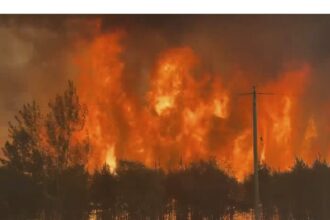As the dust settles on the Calgary Stampede grounds and the final preparations unfold for the city’s signature summer event, Alberta health officials have issued an urgent warning about a looming threat that has nothing to do with bucking broncos or bull riders. A significant uptick in measles cases across the province has triggered alarm bells, with officials concerned that the massive influx of visitors to the Stampede could create perfect conditions for a widespread outbreak.
“The combination of international travelers, dense crowds, and our already concerning measles numbers creates a potential public health challenge,” Dr. Mark Joffe, Alberta’s chief medical officer of health, explained during yesterday’s press briefing. “We’re tracking seven confirmed cases in the province already this month—a number that exceeds our total for all of 2023.”
The annual 10-day festival, which attracts over a million visitors from across Canada and internationally, presents unique challenges for disease containment. Alberta Health Services (AHS) has mobilized additional resources, including expanded vaccination clinics in the Calgary zone that will operate with extended hours through the Stampede period beginning July 5.
What makes this year’s situation particularly concerning is the global context. The World Health Organization recently reported a 3000% increase in measles cases across Europe, while parts of the United States have declared public health emergencies due to similar outbreaks. With international travel returning to pre-pandemic levels, health officials fear these global trends could impact Alberta’s public health landscape.
“Measles is one of the most contagious viruses we know,” noted Dr. Deena Hinshaw, infectious disease specialist formerly with AHS, now consulting on the Stampede health response. “One infected person in a crowded Stampede venue could potentially expose thousands before showing any symptoms themselves.”
The virus’s ability to remain airborne for up to two hours after an infected person has left an area makes it particularly challenging to contain in crowded environments like midways, grandstands, and exhibition halls. Officials are particularly concerned about children under five and immunocompromised individuals who face the highest risk of serious complications.
The current vaccination rates in Alberta present another layer of concern. According to AHS data, childhood vaccination rates in some Calgary communities have dipped below 85%—significantly short of the 95% threshold epidemiologists consider necessary for effective herd immunity against measles.
“This isn’t just about individual risk,” emphasized Dr. Joffe. “This is about community protection. When vaccination rates fall, we lose the shield that protects our most vulnerable citizens—infants too young to be vaccinated and those with medical conditions preventing immunization.”
Stampede organizers have responded swiftly to these concerns, working in close coordination with health officials to implement enhanced safety measures. These include setting up vaccination stations at key entry points, deploying additional medical staff throughout the grounds, and establishing isolation protocols for any suspected cases.
“The Calgary Stampede has always prioritized visitor safety,” stated Steve McDonough, Stampede Board Chair. “We’re working hand-in-glove with health authorities to ensure appropriate precautions are in place while still delivering the world-class experience our guests expect.”
For concerned parents and visitors, health authorities recommend ensuring all family members are fully vaccinated at least two weeks before attending the Stampede. Anyone experiencing fever, rash, cough, runny nose, or red eyes should avoid attending altogether and seek medical attention.
The economic implications of these health warnings remain unclear. The Stampede contributes an estimated $540 million annually to Alberta’s economy, and local businesses depend heavily on the influx of tourism dollars. However, health economists note that the cost of a significant outbreak could far exceed any short-term economic benefits of proceeding without adequate precautions.
As Calgary prepares to don its western wear and welcome the world to its doorstep, the question remains: can the city successfully balance its cherished tradition with the public health imperatives of our time? As vaccination clinics extend their hours and health officials remain on high alert, the next ten days will provide a critical test case for large-scale event management in an era of resurgent infectious disease concerns.










